Potion Craft Review

TL;DR: I rate this game 4/5. I'd recommend giving it a go.
I've played a lot of games, and it's rare that I find a game that tickles my brain in the right places to keep bringing me back for more, even when I've finished it. Because:
- Potion Craft isn't super popular,
- at the time of writing, I'm one of 2.5% of players that have crafted the Philosophers Stone,
- and I've taken a look at the hardcore community following the game,
I feel like I understand everything the game has to offer and can give it a thorough critique. Contains spoilers.
A Summary of Potion Craft
Potion Craft is a casual game where you roleplay as a powerful alchemist from the Middle Ages. It's available on the PC, PlayStation, Xbox, and Switch. In-game, you discover and craft new potions from herbs and crystals provided by wandering merchants, which you sell to members of your community to help them solve various problems. The money you get from selling artisinal potions allows you to fund:
- the purchase of more and rarer ingredients to craft new potions, and old potions more efficiently.
- the repair of your alchemy machine, which is a fancy tangle of tubes and alembics that you use to crystalize combinations of potions into fancy gemstones.
- recipes for fancy salts using the aforementioned gemstones.
One of the most unique aspects of the game, is the crafting process of "creating a potion".

Adding ingredients and mixing them into the cauldron moves your potion around on a map shrouded in mist. Pumping the bellows adds effects to the potion and spins whirlpools. Diluting the potion moves it back to the centre. Crushing up ingredients with the mortar and pestle extends the effect of each ingredient (and is extremely satisfying). This crafting system is fun, and a fresh twist on crafting in videogames. Once you've made a recipe, you can add it to your recipe book so that crafting more is as easy as clicking a single button. That's essentially the game!
What makes Potion Craft fun?
This description doesn't really touch on why the game is actually fun though. Similarly to how describing a Call of Duty game like: "As a soldier, you perform several missions around the world to stop evil Russians from invading America in an alternate future" doesn't even begin to touch on why the game is so popular and fun.1 An interesting analogy I heard from this YouTube video in which Ben Brode (lead designer of Hearthstone and founder of the company behind Marvel Snap) talks about approaching the design phase of a game like a trip to the supermarket, where you buy six different ingredients (game mechanics) and cook them into a meal (your game). I'm going to try to break Potion Craft down into its ingredients, and talk about the different mechanics in the game that I enjoyed, and kept me coming back.
Exploration and "What Comes Next"?
When I say "Exploration", I don't mean literally exploring as you might in Zelda: Breath of the Wild, where you explore your surroundings; I mean it in more of a: "Ok, this game clearly has a bunch of mechanics that are going to, over the course of the game, reveal themselves to me. I can't wait to see what they are, and what they do!". When I write this down, it doesn't even sound fun, but let's take Cookie Clicker or really most Incremental Games as examples here. For essentially every game in this entire genre, some amount of fun can be derived from the "ooo green line go up" aspect of the game, but I think most of the fun comes from: "Ok, I wonder what will happen when I eventually do X", which then drives you to do X so you can find out. Here are some examples from Cookie Clicker:

Oh jeez, I wonder what this next thing I can unlock is?

Oh man, I've been playing for 3 hours, and I have only unlocked 33/622 achievements? What else does this game have in store for me? I wonder how many other types of milk there are?

Wait, what's an ascention! I can't wait to find out what that does! Etc.
Another similar example might be when I first encountered the skill tree in Path of Exile:
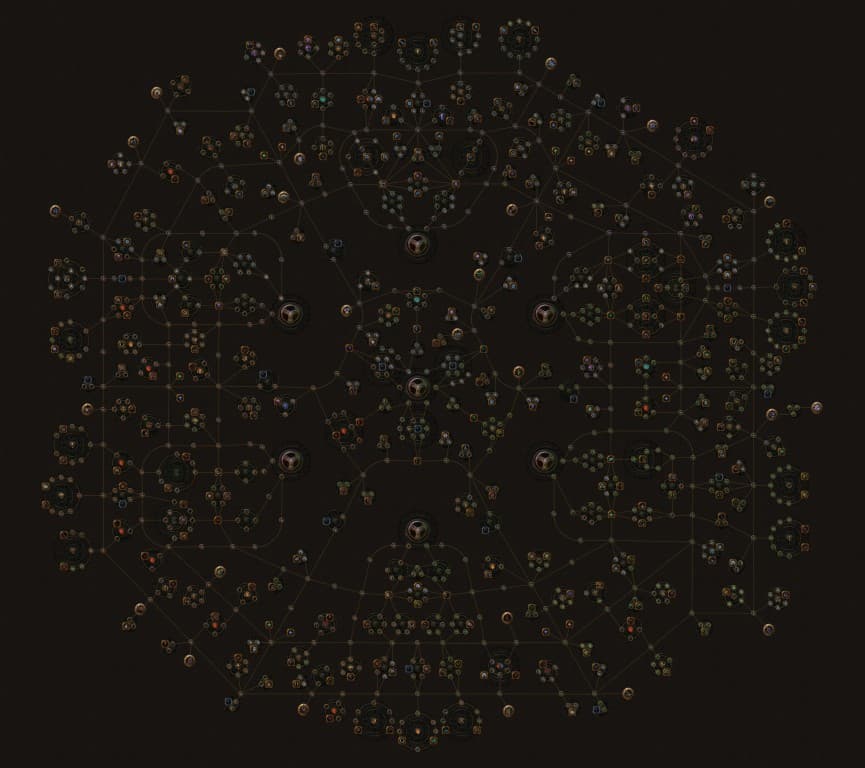
for which the only real first response can be something like: "Holy shit, that's enormous" as you get excited about exploring the depths of it at a later date.
Potion Craft harnesses this innate human curiosity and urge to explore in many different ways, like:

When you first start the game, you have no idea how to make any potions, and you need to discover them. The map you use for crafting is shrouded in mystery, and you need to explore every nook and cranny of it to make the rarest potions. As you travel to the outskirts of the map, you discover more difficult areas to navigate that require higher-tier potion ingredients.

There are tabs scattered around the game which essentially say: "Don't worry homie, you'll get this later".

You have a huge tome of challenges, with the game always prompting you to discover the next potion, or hunt down the next achievement.

You initially have all the advanced alchemy machine recipes, however they haven't been repaired, and you need to complete some objective before you can create them.
All-in-all, one of the main reasons to play this game in the early-to-mid game is because you want to see what the game has to offer! If everything you've seen so far has been fun, you have every reason to believe the next thing you'll discover will be fun as well, and add more depth and entertainment to the game.
Organisation
When things are organised nicely, your brain squeezes out some dopemine. It's why having clean and organised cupboards and pantries in your house looks and feels good. It's the only reason I make my bed in the morning. It's why people enjoy taking their Stardew Valley farms from looking like this:
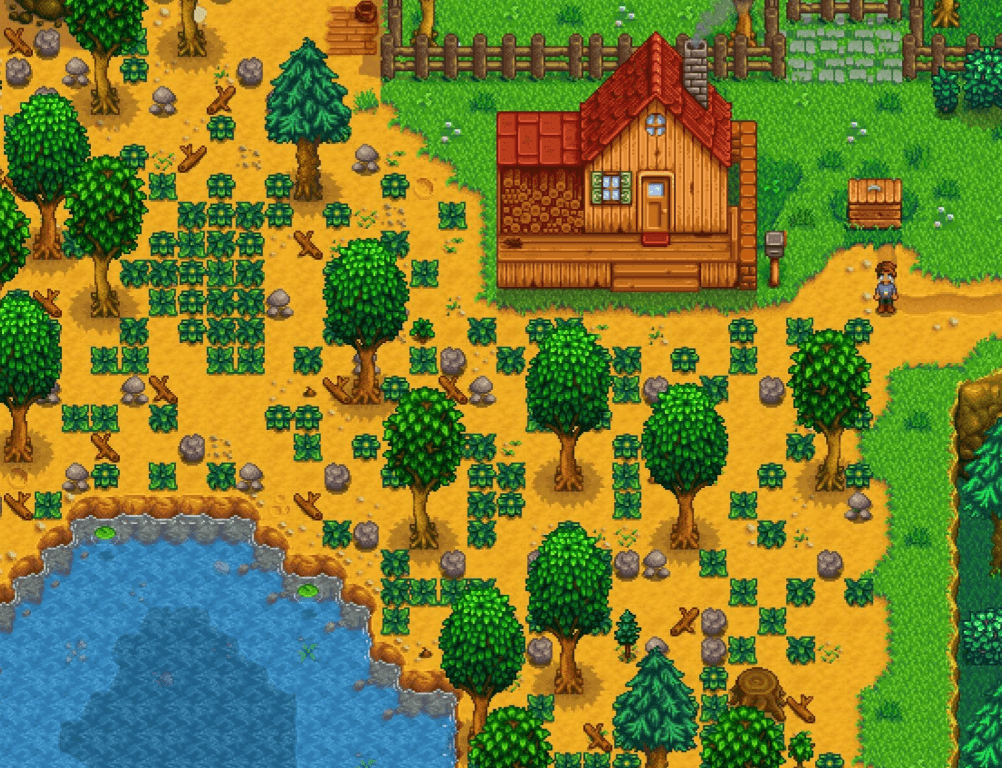
to this:
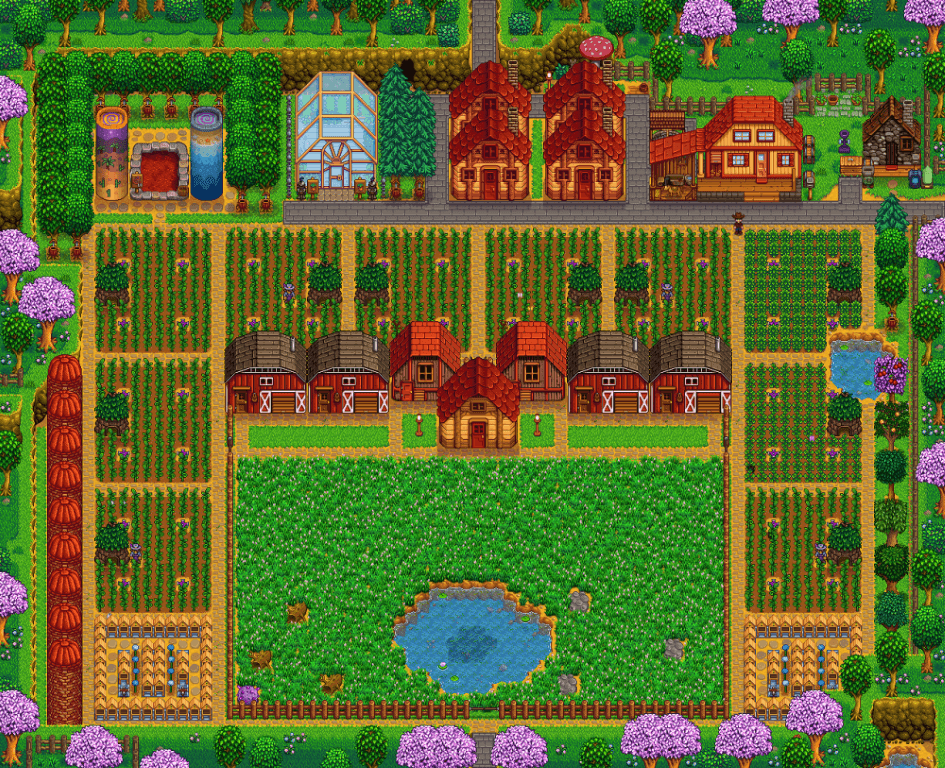
It's why people make beautiful Animal Crossing villages, and it's the whole reason the genre of satisfying/organising games like Unpacking and A Little to the Left exist.
Potion Craft is a relatively small game compared to some of the aforementioned games, but it allows you to organise your potions in a few different ways and apply some personal flair to them. Here is my recipe book in-game:

I've organised it with powerful potions of all types along the top, right, and curling around to the bottom. White recipes of the rarest potions are recipes where I've positioned the potion at the correct location for the rare effect, but have not rotated the potion yet (which requires rare salts) in case I either run out of a particular salt, or a customer asks specifically for a weak potion. Along the left and bottom left sides are my recipes for custom and highly specific potions to create legendary substances and various salts. This is my recipe book, and I'm proud of it! It contains a distillation of hours spent discovering various potions, and I've arranged the tabs specifically to allow me to find things quickly. The game allows a bit of customisation with potions too. When saved, you can customise the bottle, tag, icon, and colour of the potion. You can even add custom descriptions for each potion, like these that I've found online:

or this:

or this 😈🍆:

These custom potions you can create often conjure up interesting imagery and are a constant source of funny memes online:
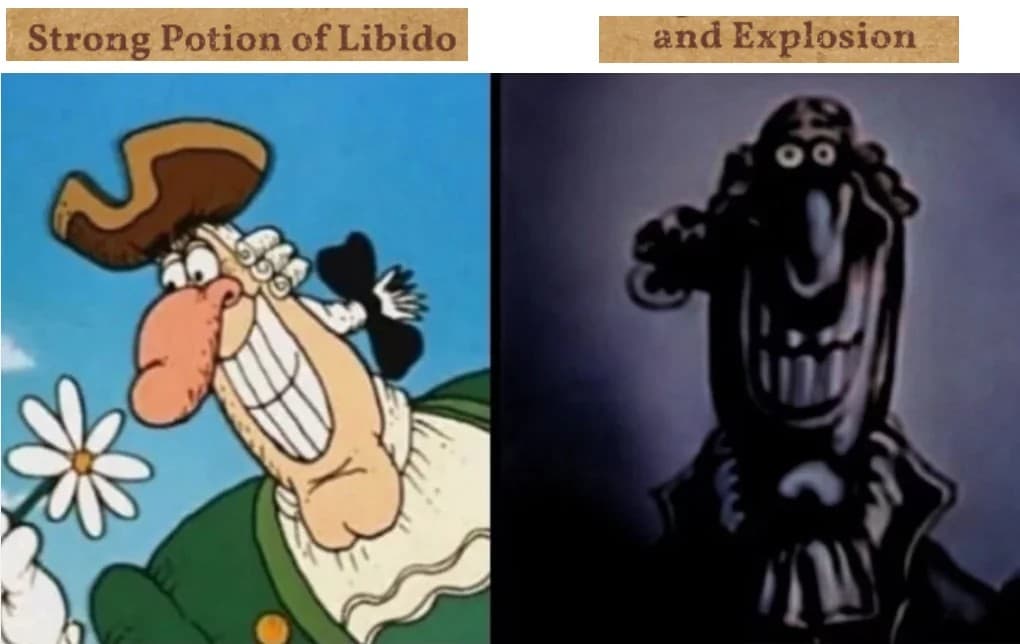
In addition to this, the game lets you grab any item from your inventory and place it in the world somewhere. You can throw them around and place them where you want, leading people to organise their potions in the shop like this:

or even just decorate rooms like this:

This slight freedom to decide how you want to organise yourself to complete the game brings a certain joy.
Optimisation
I'm a big Factorio and Dyson Sphere Program enjoyer, math enjoyer, and software engineer, and therefore thoroughly enjoy optimising all the fun out of games. The process of optimisation is the fun! Games that allow the player to try different methods of accomplishing the same result, and provide different methods of optimisation are fun in a very interesting way. In Factorio you might be interested in laying out your factory logically, or maybe you purely want the highest throughput per unit area possible. Both are valid ways to enjoy the game, and games with this tend to attract engineering type people who enjoy iteratively solving a problem in more efficient ways.
There are two types of optimisation in Potion Craft.
Optimisation of Time
Crafting potions takes time. Crafting a simple health potion might take a few seconds, but crafting a level 3 rejuvination potion might take 20 minutes, and I don't even want to think about the time required to craft some of the Philosophers Salt recipes. As you progress through the game, learning all the different potions, you add them to your recipe book. After you've got a recipe in the book, you can smash that "Brew This Recipe" button to instantly create the potion for whoever needs it. Similarly, you can (and should) save the individual constituent potions of the legendary recipes, speeding up the process of creating legendary substances, so that after creating the first one, subsequent substances take only a fraction of the time to create. This "productivity increase" is satisfying. As you enter the late game, you can just create potions for customers 30 at a time, and spend less time navigating the crafting map.
Optimisation of Cost
While optimising the Potions per Minute (PpM) you pump out is satisfying, it's also satisfying to try to create the most efficient recipes you can. Each ingredient has a base price, and each potion has a much higher base price. The difference in the cost of the base ingredients you use to create a potion, and the price you sell the potion at is your profit. In order to increase profit, you want to make the most efficient potions you can!
When crafting potions, there are an infinite number of ways to craft any particular potion. For example, to create a level 3 health potion, I could use 2 Lifeleaf:

or I could use one Evergreen Fern!

Well, the base cost of the Lifeleaf is $24, and the base cost of the Evergreen Fern is $86.4, so the most efficient way to make this recipe is to use 2 Lifeleaf.
What makes cost optimisation more interesting is that you can use salts to rotate potions and the paths that they take, giving more efficient options to craft potions. However, the cost of these rotational salts is quite complex to calculate. For example, to create Moon Salt you need 9 constituent potions and Albedo. Albedo itself requires 9 constituent potions and Nigredo, and Nigredo requires 5 potions! So the price of Moon Salt, and thus the price to rotate your potions depends on the optimised recipes for the 23 constituent potions of Moon Salt! Discovering a new and more efficient way to make level 3 sleep potions will not only yield more profit when selling it, but as a constituent of Nigredo, will also make ALL salts cheaper, which may, in-turn, allow people to uncover even MORE efficient potions.
I don't think it's possible to write code to easily search the "potion space" for all the most efficient recipes. It's probably possible, but the search space is enormous, and the algorithm would have to take into account:
- The bone areas which kill you if you travel in them for too long.
- Crystals which CAN teleport you through bone areas.
- Using salt at any time to rotate the path.
- Distilling at any time to move you into the centre AND unrotate the path.
- Using whirlpools to move and teleport.
- The oil slicks in the oil base.
- Searching all bases!
It would be very complex, so as far as I know, nobody has attempted to make one.
When I was playing, I intended to write some code to figure out the costs of all my salts, and attempt to find some more efficient recipes. I thought this would possibly be a unique contribution to the Potion Craft community. However, since I've never had an original idea in my life, after doing some looking, a spreadsheet exists in the community which keeps track of the most efficient way to craft all necessary potions in the game. Not only does it calculate the most efficient recipes from a $/potion standpoint, but it also tracks the recipes which use the fewest ingredients, and also the most efficient recipes that fulfil some arbitrary self-imposed rules the masochistic community likes to place on themselves, like:
- Highlander (You can't use duplicate ingredients)
- Lowlander (You can only use 1 ingredient)
- Plenty more which can be found here.
This spreadsheet enlightened me that for the simplest potion in the game, the humble health potion, my two Lifeleafs at $48 actually pales in comparison to the Goodberry + 9 Sun Salt rotated recipe in an oil base at $39.78 per potion using the currently most efficient method of producing Sun Salt. Wowzers. I was quite pleased with some of my own recipes, for example my recipe for hallucination used the same number of ingredients, and my recipe for the libido potion was exactly the same as the most optimised one. Most others were far worse.
Possibly one of the most impressive discoveries when looking through these optimised recipes, was that someone made an in-browser potion simulator that you can use to tweak recipes and share them! For example, you don't believe that it's possible to make that health potion for only $39.78 dollars? Well here, I can prove it. For a relatively small game, this website is a huge feat of engineering and very impressive.
These optimisations and the repeated tinkering you can do with different recipes is one of the main aspects of the gat that kept me coming back to play.
Aesthetic and Uniform Art Direction
Things that look good, make us feel good. Potion Craft looks good.
Every art asset in this game has been drawn in a medieval-cartoon style. Every menu, character, plant, and crystal have been drawn to match the style of the game, it's hard to describe, but this sort of artistic polish makes you feel good when you're playing it.
Story
Story is also a classic driving element of games and Potion Craft really makes you feel like a potion seller. Through brief encounters with your customers each day, and listening to the stories they tell in their roundabout ways of asking for potions, the game has a small chance to build the world around the seller. I think Potion Craft's method of story telling has been executed pretty poorly, but if it was done incredibly well, it would probably look similar to how Hades handles it - with repeat encounters between the player and various characters slowly drip-feeding a story a few lines at a time. Potion Craft does not do this well, but there are elements of it in the game, so it still gets an honorable mention because the ~20 custom sentences given to the herbalist are enough to evoke the following emotions from the average Redditor:
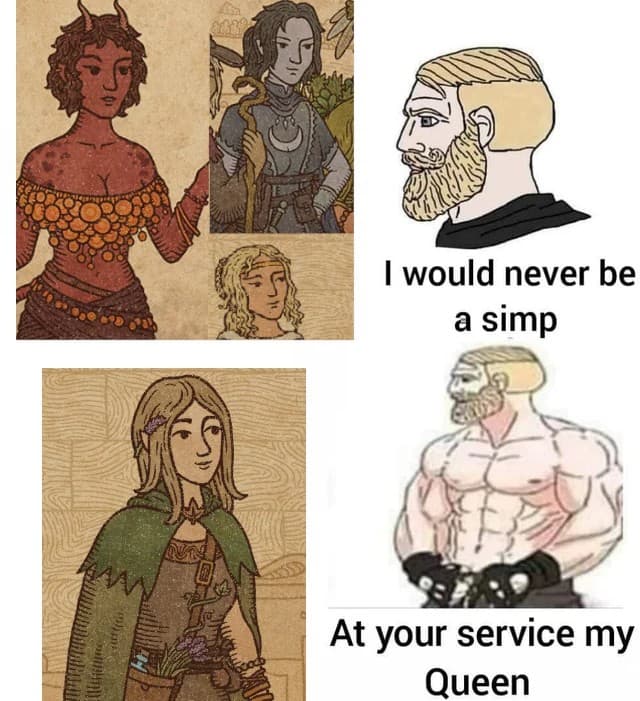
What Makes Potion Craft NOT fun?
Potion Craft is a great game, but it has one main con:
The end-game is a grind.
I'm going to break down exactly why the endgame is a grind by using all the aforementioned elements of Potion Craft that make it so good! But before I do, let me quickly explain the rough milestones of Potion Craft:
- Create Nigredo
- Create Void Salt
- Create Albedo
- Create Moon Salt
- Create Citrinas
- Create Sun Salt
- Create Rubedo
- Create Life Salt
- Create Philosophers Stone
- Create Philosophers Salt
- Get to Alchemist Rank 15
At this point, you'll have completed the entire "Alchemists Path" achievement book, and essentially the whole game. If you're still reading this article, and remember from the top, I created the Philosophers Stone and I'm in the top 2.5% of players on Steam who achieved that. I didn't even complete the whole game! Why not? Well... Because there is no point! Let's revisit what makes Potion Craft so good, and talk about why it suffers after about point 6 on my milestone list.
Exploration and "What Comes Next"?
After about "Create Sun Salt", you'll have discovered the entire map and all the potions on it. That's not bad! The map can't extend forever with a limitless number of potions. It's just that after a while, the sense of discovery is gone.
Also, you'll be a little confused because the game has a "Shop Upgrades" tab which seems to promise that you'll be able to buy new and exciting parts from merchants in the future to either cosmetically enhance the shop, or somehow alter the potion crafting experience. You'll wonder why this hasn't happened, Google it, and realise that it isn't implemented yet and will come in a later patch. 😑

Organisation
Realistically, you organise your shop how you like and eventually buy enough pages for your recipe book so that you can fill it up. This also happens at around the "Create Sun Salt" phase of the game.
Optimisation
Optimisation of Time
After Sun Salt, this actually gets WORSE. As you increase in rank from "beginner baby alchemist", to "best friggin alchemist ever" you encounter more and more difficult customers. Initially they just ask for more complex recipes, but later on they get picky and say things like: "Oh hey, I need a weak potion of sight" or "I need a health potion, but it simply must be half Poopshroom or I won't accept it". It's fine to do this, and adds something cool and different to the game, however when an enormous number of randomly generated variants of each potion are required, the usefulness of the recipe book approaches zero, completely undermining (for me) one of the most compelling reasons to play the game in the first place.
Optimisation of Cost
If we consult the handy spreadsheet of 'most optimal potions', we can see how many optimal potions use each type of salt. Contrast this to the salts you find early in the game:
- Void Salt - 0 optimal potions use this.
- Moon Salt - 23 optimal potions use this.
- Sun Salt - 54 optimal potions use this.
- Life Salt - 0 optimal potions use this.
- Philosophers Salt - 4 optimal potions use this.
Obviously Moon and Sun Salts are useful, and the rest are essentially garbage. If unlocking these salts adds no cost optimisation potential to the game, why bother unlocking them at all? This is why I can't bring myself to spend multiple hours creating Philosophers Salt. There isn't a reason to do it! After Sun Salt, no new optimisation mechanics are unlocked!
Story
There are a couple unique fellas that rattle about in Potion Craft:
- The various merchants
- The witcher guy
- The guy who catches the weird fish
and finally this fuckin' weirdo:

There is a little bit of flavour text, but at about the Sun Salt level, these guys just stop coming to the shop! The witcher guy promises that maybe he'll start selling monster parts in the future, but that's not implemented. There is a huge potential here to tell a story, drip feed the player morsels of information about the village and world of potion craft! I want obscure lore, I want more dialogue options, and I want a story damn it! If, like Hades, relationships continued to evolve and stories continued to be told after the game was completed, I'd want to keep playing to see what happens!
What makes Potion Craft not fun, a summary
In short, honestly, once you've got Sun Salt, nothing else new happens! Nothing changes, and you're not rewarded for continuing to play. The game is over. But you're not told that. At this point, you'll either feel shame for quitting, or grind all the way to Philosophers Salt with minimal enjoyment so that you've completed the game. Neither of these options sound particularly enjoyable.
Ideas for Improvement
Here are just some ideas / suggestions that I think would improve the game:
- More bases with unique mechanics.
- Please give me shelves or some method of viewing all different types of potion simultaneously. This would make serving customers faster and easier.
- There is a mod that already does this, so I'm clearly not the only person who wants it.
- I like adding additional tweaks to potions for extra money, but I don't think requiring them is the right move. Maybe just remove this?
- More magic tabs, or maybe multiple recipe books.
- More unique characters.
- More detailed stories behind characters.
- Maybe custom cauldrons or spoons etc, locked behind stories which require funny and interesting potions?
- Relationships between characters?
- Maybe choosing one merchant as a favourite, means another no longer visits you?
- Mechanics that change cost optimisation late game. (e.g. more impactful salts).
- More things between sun salt creation, and philosophers stone creation.
Summary
Potion Craft is an awesome game that I thoroughly enjoyed. I've been following the rare dev logs here and eagerly await the Potion Craft v2.0 update in which a whole slew of new content has been promised. I hope it solves some of the problems that currently exist.
Footnotes
-
And the fact that I had to spend 10 minutes re-reading the plot of CoD MW2 (2009) to understand what actually happened in that game (I still don't understand) - despite having probably sunk >1000 hours into it - underscores the reality that the fun comes from several unmentioned features of the gameplay loop, rather then an explanation of what the game is about. ↩